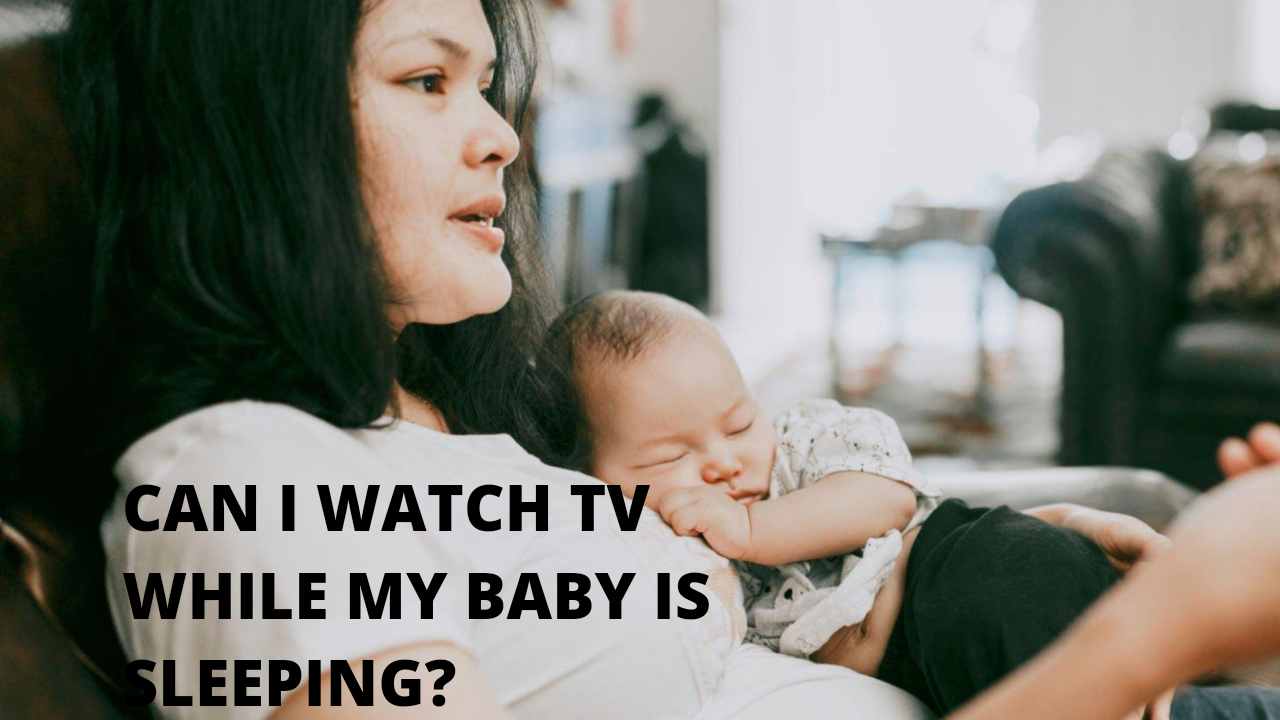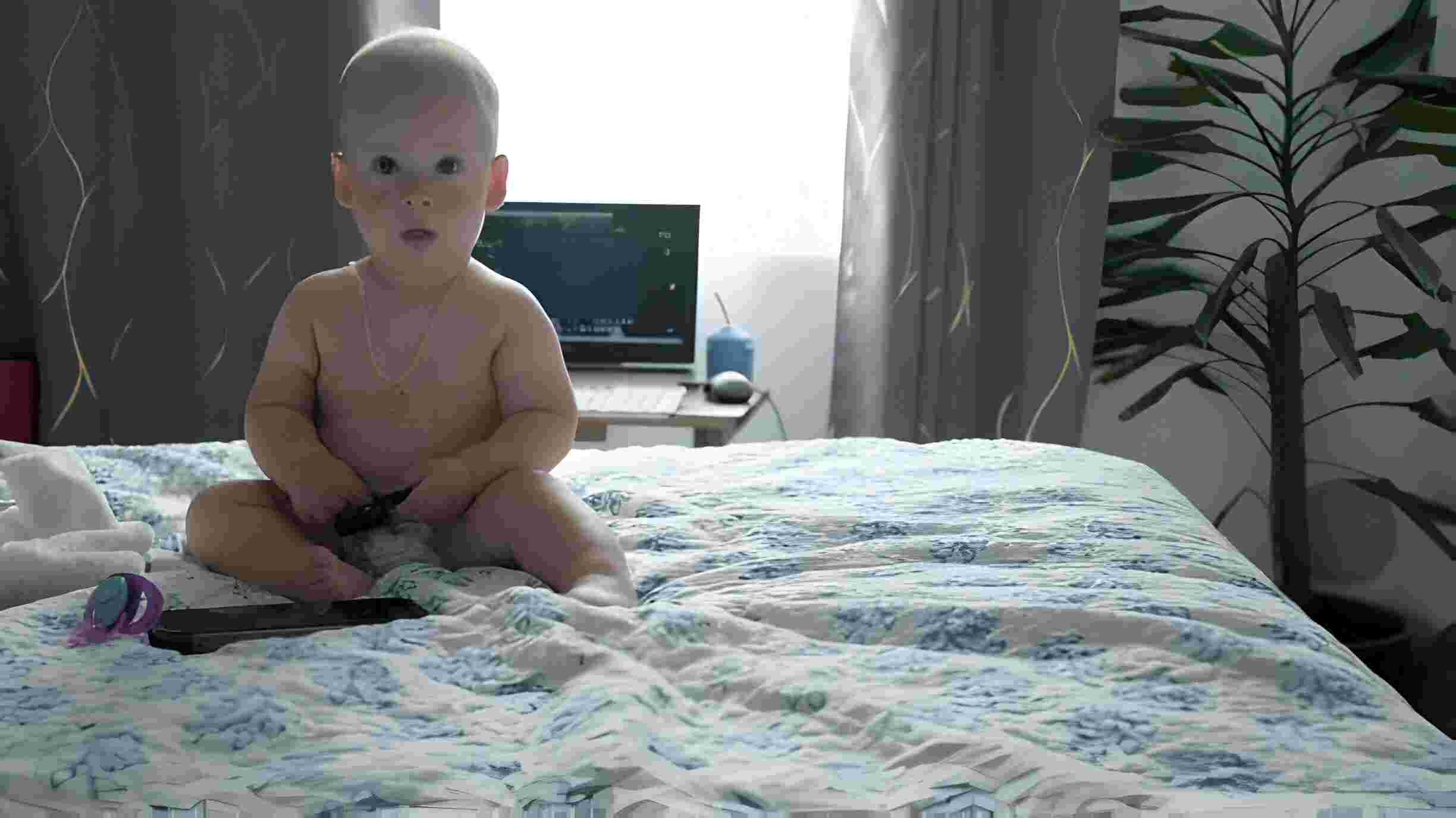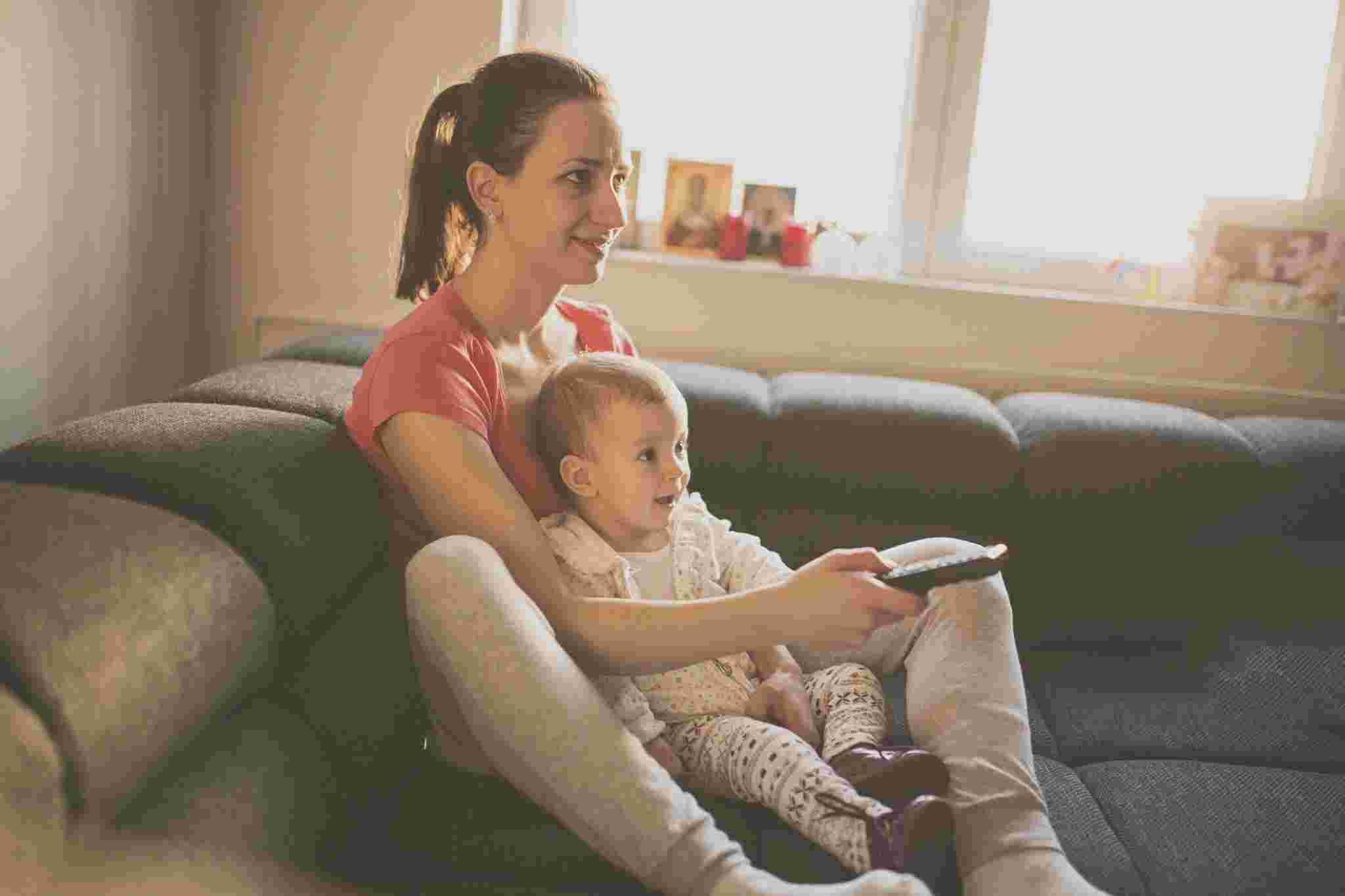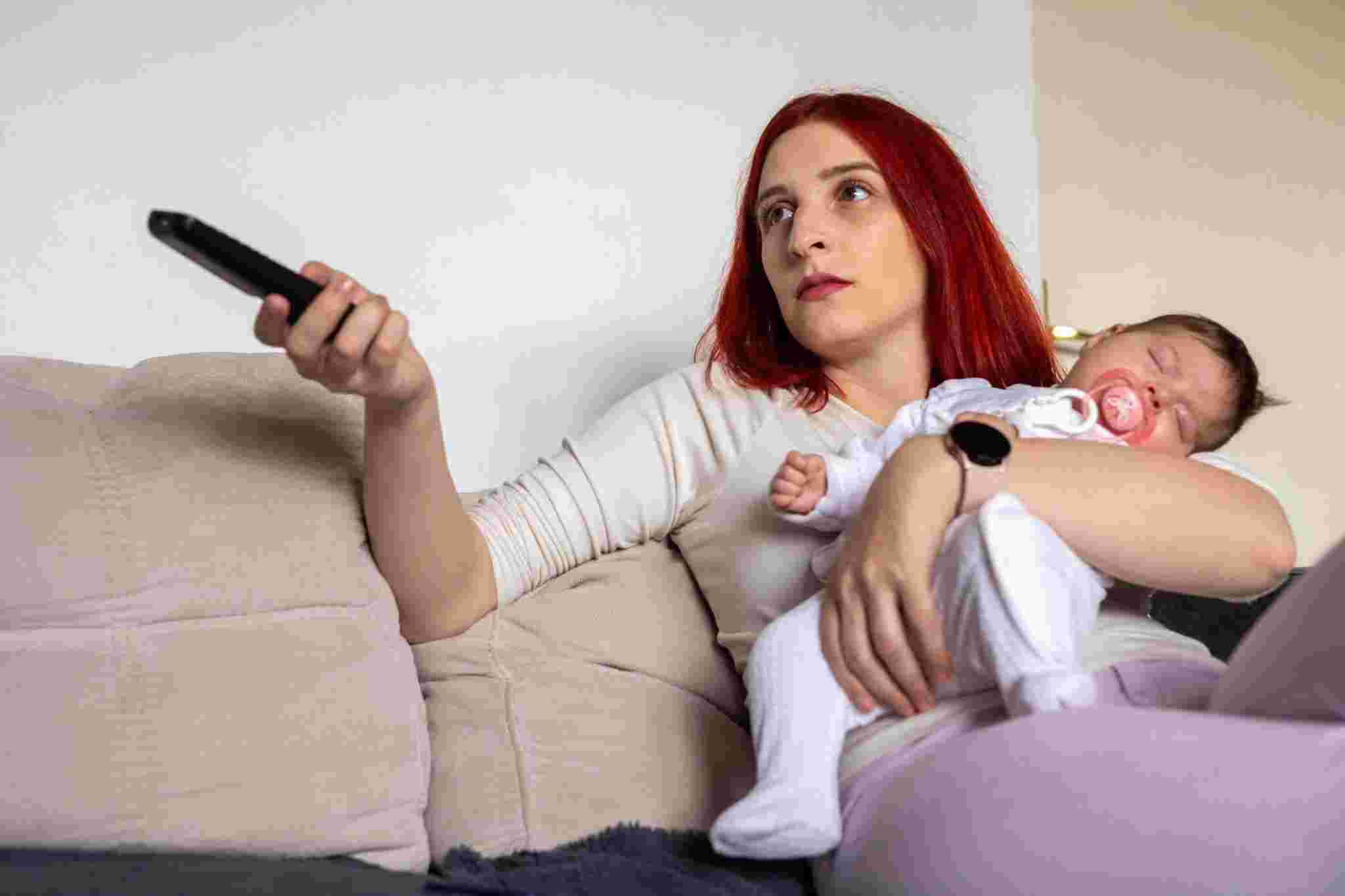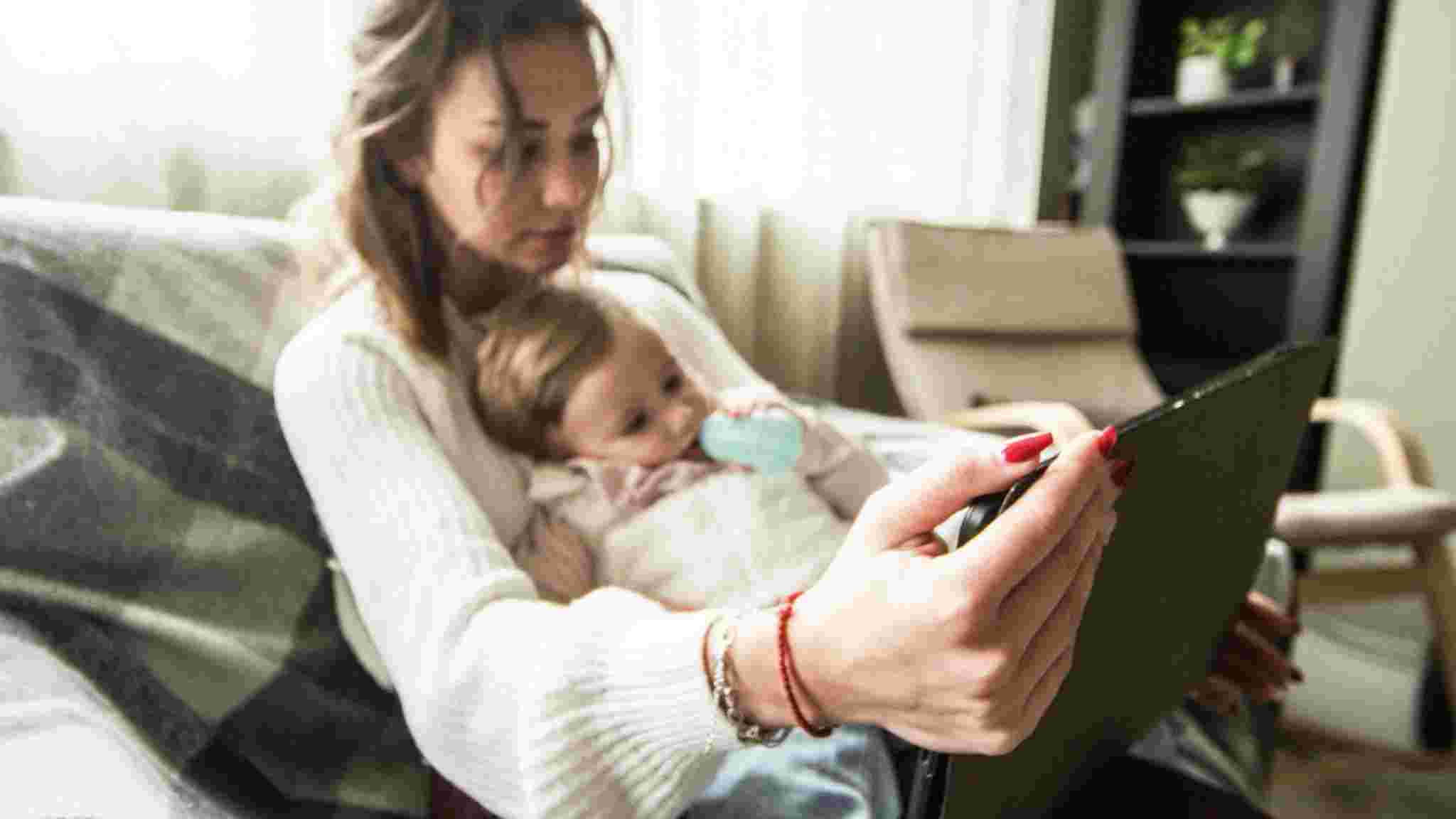Can I watch TV while my baby is sleeping? As a new parent, finding time to relax and unwind can often be a challenge. The hours when your baby is asleep may seem like a precious opportunity to catch up on your favorite TV shows or movies.
However, there is an ongoing debate about this topic, ”Can I watch TV while my baby is sleeping?”
Balancing your entertainment needs with your baby’s sleep environment is crucial for their well-being and development.
In this article, we aim to provide the factors you should consider when deciding whether to watch TV while your baby is sleeping.
We’ll discuss the potential impact of television on your baby’s sleep patterns, cognitive development, and the overall sleep environment.
Additionally, we’ll provide tips and alternatives to help you create a suitable and nurturing sleeping environment for your little one.
So, let’s delve into the world of screen time, sleep, and parenthood, and explore the question: Can I watch TV while my baby is sleeping?
Can I watch TV while my baby is sleeping?
The short answer is that parents can watch TV while their baby sleeps, but it’s not advisable. The primary reason is that the sound and visual stimulation from the TV can disturb your baby’s sleep and make it harder for them to fall asleep or stay asleep.
Additionally, if you have the TV volume up too loud, it can be harmful to your baby’s hearing.
Babies require a peaceful and quiet environment for sleep, as it helps them to develop healthy sleep patterns and get the rest they need for their growth and development.
You should create a calm and soothing atmosphere in the room where your baby is sleeping. Dim the lights, minimize noise, and try to maintain a quiet environment.
Watching TV while your baby is sleeping is a personal choice that depends on various factors.
1. Noise level:
TVs can generate sound that might disturb your baby’s sleep. Some babies are more sensitive to noise, while others may be able to sleep through it. Consider the volume and type of content you plan to watch.
Kindly read:
- How long should I let my baby sleep after vaccinations? Explained
- My toddler is destroying my house (What to do)
2. Light exposure:
The bright light emitted by a TV screen 1can interfere with your baby’s sleep patterns. Exposure to light, particularly blue light, can disrupt their natural sleep cycles and make it harder for them to fall and stay asleep. If you choose to watch TV, ensure that the room is adequately darkened or that the screen is not facing directly towards your baby.
3. Parental attention:
While your baby is sleeping, it’s an opportunity for you to relax, engage in self-care, or attend to other household tasks. If you decide to watch TV during this time, make sure you can still be attentive to your baby’s needs. It’s essential to be able to hear if your baby wakes up or requires your attention.
Can you have a TV in a baby’s room?
No, having a TV in a baby’s room is not recommended by experts in child development.
The American Academy of Pediatrics (AAP) advises against having a television in a child’s bedroom, especially for children under the age of 18 months. The AAP recommends that children under 18 months avoid any screen time (including television) except for video chatting.
While there is no strict rule against it, there are several reasons why it is advised to avoid placing a TV in a baby’s room:
1. Sleep disturbance:
Television screens emit bright light and can disrupt a baby’s sleep patterns. The stimulating content and noise can make it harder for babies to fall asleep or stay asleep, leading to sleep disturbances.
2. Overstimulation:
Babies are easily overwhelmed by excessive sensory stimulation. The fast-paced visuals, sounds, and changing images on a TV can be too stimulating for a young child and may hinder their ability to focus and engage in other important activities, such as play and exploration.
3. Language development:
Babies learn language and communication skills by interacting with caregivers and the environment.
Excessive exposure to television at a young age can limit opportunities for meaningful interactions and language development, as babies may spend less time engaging with people and more time passively watching television.
4. Content control:
The content shown on television may not always be suitable for young children. Even if you carefully choose age-appropriate programming like cartoons, it can be challenging to ensure that all the content your baby is exposed to is appropriate and beneficial for their development.
5. Sedentary behavior:
Having a TV in your baby’s room may encourage sedentary behavior, promoting a passive lifestyle instead of active play and exploration. Physical activity is crucial for your child’s growth, development, and overall health.
6. Potential negative effects of excessive screen time:
Research suggests that excessive screen time during early childhood can have various negative effects. It may lead to language delays, attention problems, difficulties with executive functioning, decreased social skills, and increased risk of obesity. It can also interfere with the quality and duration of sleep, which is crucial for a baby’s development.
7. Alternative activities:
Instead of relying on screens for entertainment, there are numerous activities that can be beneficial for babies’ development. These include reading books, engaging in imaginative play, listening to music, exploring the outdoors, doing simple arts and crafts, and playing with age-appropriate toys that encourage exploration and problem-solving.
8. Parental role modeling:
It’s important for parents and caregivers to be mindful of their own screen usage, as children often imitate what they observe. Setting limits on your own screen time and prioritizing quality interactions with your baby can create a positive example and foster healthy habits.
Is TV Considered screen time for babies?
Yes, TV is considered screen time for babies and young children. Screen time refers to the amount of time spent engaging with electronic screens, such as televisions, computers, tablets, and smartphones. Watching TV falls under this category.
The American Academy of Pediatrics (AAP) recommends that children under the age of 18 months avoid all screen time, except for video chatting with family members. This is because young babies and infants learn best from real-world interactions and experiences.
For children aged 18 to 24 months, limited screen time can be introduced, but it should consist of high-quality, educational programming or interactive content that parents watch with their child and discuss together. The AAP suggests keeping screen time to a maximum of one hour per day for children in this age group.
However, it’s important to note that interactive and engaging activities, such as playing or reading books with an adult, are more beneficial for a child’s development than passive screen time.
When should I stop watching TV around my baby?
When it comes to deciding when to stop watching TV around your baby, it’s important to consider the potential impact of screen time on their development and well-being. While there isn’t a specific age that universally applies to all babies, you should consider the following:
1. Avoid screen time before 18 months:
The American Academy of Pediatrics (AAP) recommends avoiding screen time, including television, for children under the age of 18 months, except for video chatting. At this stage, babies benefit more from interacting with their caregivers and exploring the real world.
2. Prioritize face-to-face interaction:
Babies thrive on social interaction, especially with their parents or caregivers. Spending quality time engaging in activities, such as talking, singing, reading, and playing, is crucial for their development. It’s important to prioritize these interactions over passive screen time.
3. Limit screen time for toddlers:
For children aged 18 months to 2 years, the AAP recommends introducing high-quality programming if you choose to expose them to screens. However, it’s essential to limit screen time to no more than 1 hour per day and actively engage with them while watching. The content should be age-appropriate and supervised.
4. Encourage educational content:
If you decide to allow your child to watch TV, choose educational programs that are age-appropriate, interactive, and designed for early childhood development. Look for shows that emphasize learning, social skills, creativity, and problem-solving.
5. Be mindful of content and context:
Ensure that the content your baby is exposed to is appropriate, safe, and aligns with your family values. Be cautious about exposure to excessive violence, adult themes, or commercials targeting children.
6. Quality over quantity:
If you choose to allow your child to watch TV, select educational programs that are designed for their age group. Look for shows that promote social interaction, language development, and learning skills. Limit screen time to a reasonable duration, no more than 1 hour per day for children aged 2 to 5 years.
7. Create a screen-free environment:
Establish screen-free zones or times in your home, especially in areas where your baby spends a significant amount of time, such as the nursery or play area. This helps promote a healthy balance between screen time and other activities.
8. Set a positive example:
Be mindful of your own TV habits and minimize excessive screen time in front of your child. Children often imitate their parents’ behaviors, so showing moderation and balance is crucial.
9. Prioritize interactive activities:
Encourage activities that promote physical movement, social interaction, creative play, and language development. These experiences are essential for a child’s healthy development.
Can TV overstimulate a new born?
Yes, television can overstimulate a newborn baby. Newborns have developing brains and sensory systems that are still adjusting to the world around them.
Exposing them to excessive visual and auditory stimulation, such as bright lights, fast-moving images, and loud sounds from a television, can be overwhelming and harmful to their development.
Research suggests that excessive screen time in early infancy can negatively affect various aspects of a baby’s development. It can interfere with their ability to focus, disrupt sleep patterns, impede language and cognitive development, and hinder social interactions and emotional bonding with caregivers.
The American Academy of Pediatrics (AAP) recommends that children under 18 months of age avoid any screen time, including television, except for video chatting with family or friends. This is because their brains are still rapidly developing, and they need real-world experiences and interactions for optimal growth.
In conclusion of today’s topic can I watch TV while my baby is sleeping, the best option is to avoid it. The bright lights, loud sounds, and engaging content of television can disrupt your baby’s sleep and negatively impact their development.
Creating a calm and quiet environment during naptime and bedtime is crucial for your baby’s restful sleep and overall well-being.
Prioritizing their sleep needs over personal entertainment can contribute to a healthier sleep routine for both you and your baby.
